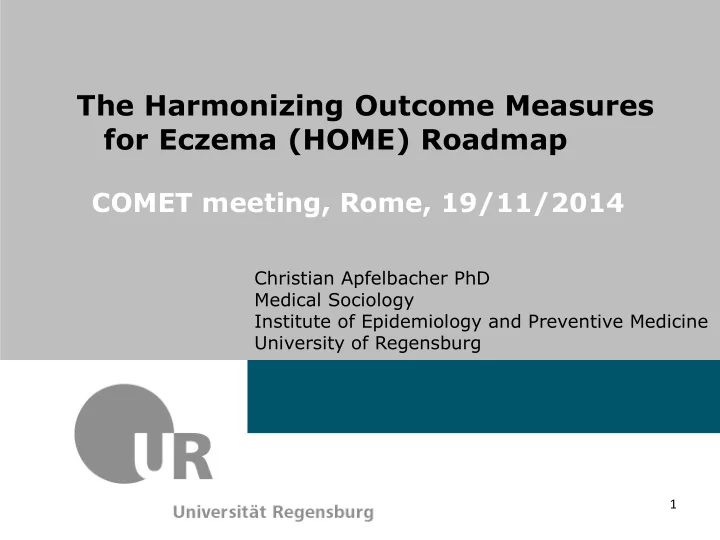

Dr. Max Mustermann Referat Kommunikation & Marketing Verwaltung The Harmonizing Outcome Measures for Eczema (HOME) Roadmap COMET meeting, Rome, 19/11/2014 Christian Apfelbacher PhD Medical Sociology Institute of Epidemiology and Preventive Medicine University of Regensburg 1
The problem Atopic eczema/eczema/atopic dermatitis (Neurodermitis)
What’s all SCORAD scores again the FSSS about? SASSAD rules Take it OK EASI Give me a POEM TIS a right mess ADASI tonight? Me too! Meet my SIS IGADA bad headache My name is ADAM
What we need: core outcomes set (COS)
The HOME initiative HOME = Harmonizing Outcome Measures for Eczema Founded in 2010 (Schmitt and Williams 2010) Aim: to develop and implement a COS for (atopic) eczema Global & multiprofessional Evidence-driven and evidence-generating 5
The HOME roadmap Methods to develop and implement COS not standardized (Williamson 2012) Need for a methodological framework 6
Schmitt 2014 JID
Step 1: Define scope Condition: (atopic) eczema Setting: clinical trials & recordkeeping Geographical scope: global Stakeholders: patients, healthcare professionals, researchers, regulatory agencies, pharmaceutical companies Involving stakeholders globally needs proactive approach! 8
Step 2: Define core set of outcome domains Use of consensus methodology, e.g. Delphi Consensus process should be based on a priori protocol Protocol should include consensus rules HOME agreed that consensus is reached when less than 30% of voters disagree 9
HOME Delphi questionnaire Indication of the importance of outcome domains for eczema on a 9-point Likert scale (rounds 1 and 2) Scores 1-3: domain is not important Scores 4-6: equivocal Scores 7-9: domain is important Final round: Explicit question on whether or not to include outcome domain into the core set 2 different contexts / settings Clinical trials Record keeping in daily practice 10
Outcome domain Proportion recommending including outcome Consensus to domain into the CORE SET of outcomes for include domain eczema that should be routinely assessed in into core set every CLINICAL TRIAL on eczema? Consumer Experts Agency Editors YES Un- NO s (n=29) (n=1) (n=7) clear (n=6) ● Clinical signs (physician) 100% 100% 100% 100% ● Clinical signs (patient) 17% 21% 0% 0% Investigator global ● 33% 59% 0% 57% assessment Patient global assessment of ● 17% 34% 0% 29% ● Symptoms 83% 76% 0% 57% ● Quality of life (specific) 33% 72% 100% 86% ● Quality of life (general) 17% 3% 0% 0% ● Short term control of flares 33% 7% 0% 0% ● Long term control of flares 67% 62% 100% 43% ● Cost 17% 3% 0% 0% ● Overall extent of disease 17% 21% 0% 14% ● Involvement of high expr. 17% 7% 0% 14% areas 11 ● Treatment utilization 17% 31% 0% 14%
Preliminary core set of outcome domains Clinical trials - Measurement of eczema symptoms - Physician-assessed clinical signs using a score - Measurement for long term control of flares Recordkeeping in daily practice - Measurement of eczema symptoms Schmitt 2011 JID 12
HOME II meeting (Amsterdam 2011) 43 people came from around the world (included 4 consumers) Presentations, discussions and key pad voting Consensus rules – if less than 30% disagree
Results from HOME II Refined core set of domains to include: Symptoms Clinical signs using a score Long term control of flares Quality of life Schmitt 2012 Allergy
HOME working groups 15
Structure of the HOME initiative Executive Committee Scientific Advisory Board Project Coordinator (based at the Centre of Evidence Based Medicine in Nottingham, UK) Research working groups 16
Step 3: Define core set of outcome measurement instruments Aim: identify, validate, or develop an appropriate measurement instrument for each core outcome domain Ideally, one best instrument should be identified for each core outcome domain Five stages 17
Stages 1 & 2 Aim Identify all measurement instruments previously used to assess the domain of interest Method Systematic review Output Long list of outcome measurement instruments Aim To investigate the extent and quality of testing and the measurement properties of existing measurement instruments Method Systematic review Output Summary of extent, quality and results of any testing of the existing measurement instruments 18
Stage 3 Aim Determine which instruments are of good enough quality to be shortlisted for further consideration Method Consensus discussion and voting in relation to truth, discrimination and feasibility (OMERACT filter, Boers 1998) Output Short list of potential instruments that meet the requirements of the OMERACT filter 19
Stage 4 Aim To fully validate shortlisted measurement instruments (to fill the gaps in validation) Method Consensus discussion and voting to determine what validation studies need to be conducted Appropriate methods for validation studies Output Short list of fully tested instruments 20
Stage 5 Aim To determine the core outcome instrument for the domain of interest Method Re-application of the OMERACT filter with the results of the completed validation studies Consensus discussion and voting to determine on core outcome instrument to be recommended Output Recommended core outcome measurement instrument 21
HOME III meeting, San Diego 2013 22
HOME III meeting Roadmap completed for the domain „ clinical signs “ Systematic review indicated that only the Eczema Area Severity Index (EASI) and the objective Scoring Atopic Dermatitis Index (SCORAD) could be shortlisted (Schmitt 2013 JACI) International consensus process during the HOME III meeting: consensus that the EASI is the preferred instrument (Chalmers 2014 BJD) 23
HOME III meeting 2013 24
Consensus statement Schmitt 2014 JACI 25
Step 4: Dissemination & Implementation Publication in leading journals Dissemination to journal editors Presentations at relevant meetings Dissemination to industry and regulatory authorities Development of guidance material is recommended Important: implementation strategy! 26
Schmitt 2014 JID
Summary The HOME roadmap provides a methodological framework & guidance for COS development Roadmap completed for the domain „ clinical signs “ Working groups have started to work on the core domains „ symptoms “, „ quality of life “ and „ long term control of flares “ Useful for other COS initiatives in dermatology (COS developments for vitiligo and melanoma are underway) and beyond 28
further information: www.homeforeczema.org Thank you very much for your attention! 29
Recommend
More recommend